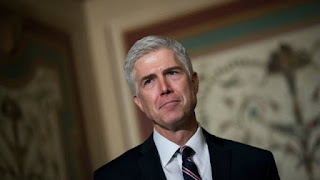Supreme Court Nominee: Pres. Trump’s Attacks on Judiciary Are ‘Demoralizing’
The fury over President Trump’s attacks on the judiciary grew on
Wednesday as even his nominee for the Supreme Court criticized his
rhetoric as “demoralizing” for the nation’s judges.
Speaking to law enforcement officials, Trump made a public show of trying to influence the judges who are wrestling with whether to lift a court order blocking his travel ban. A day earlier, the judges heard oral arguments in the case that were broadcast live on cable news networks.
He argued the judges should immediately reinstate the executive order in the name of national security.
“A bad high school student would understand this,” Trump said, after reading from a portion of immigration law he said gives him broad powers to decide who enters and leaves the U.S. The president accused the court of playing politics by not lifting the block right away.
“I listened to a bunch of stuff last night on television that was disgraceful,” he said.
The president’s attacks on the judiciary, which began over the weekend, are drawing widespread criticism — remarkably, even from his nominee to the Supreme Court, Neil Gorsuch.
Gorsuch, who is making the rounds on Capitol Hill, distanced himself from Trump’s attacks, telling Sen. Richard Blumenthal (D-Conn.) it was “demoralizing” and “disheartening” to see the president criticize a “so-called judge” in a tweet.
Trump’s broadsides at the judiciary, while typical for him, represent a major break from past presidents, who often went out of their way to show deference to the courts. Democrats and legal analysts accused him of overreach, and some suggested the attacks could hurt his case.
“One thing Richard Nixon would never have done is belittle the court,” former Nixon White House counsel John Dean said on CNN. “He might have done it in private, but never in public in his entire career.”
“I don’t fully understand what Mr. Trump’s philosophy is, that he thinks that by degrading and belittling the court it’s somehow going to help him or he’ll guide the court to get the decision he wants,” added Dean, who has often been critical of Trump. “It’s just going to be the opposite.”
Like Trump, George Washington University constitutional law professor Jonathan Turley said he disagrees with last weekend’s U.S. District Court decision to temporarily block the ban. But he agreed that Trump’s comments could backfire.
“He has good legal authority to advance in this case, but he is harming the essential credibility of his office through these comments,” he said. “It is clear that the White House counsel is either not warning the president that his comments are undermining their case or the president is not heeding such obvious advice.”
Trump’s response to the federal courts handling the suspension of his travel ban demonstrates one of his essential character traits: When he feels he’s under attack, he punches back.
The president began his onslaught over the weekend, when he suggested the public should blame District Judge James Robart if a terrorist attack occurs in the United States. Robart on Friday issued a nationwide order temporarily halting the travel ban, which had affected people from seven predominantly Muslim nations.
“Just cannot believe a judge would put our country in such peril. If something happens blame him and court system. People pouring in. Bad!” Trump tweeted.
A day earlier, he labeled Robart a “so-called judge.” The tweets continued on Tuesday, when Trump wrote that reinstating the ban “should be EASY D!”
The situation is expected to come to a head in the coming days, when a three-judge panel of the 9th Circuit Court of Appeals makes a ruling on the Justice Department’s emergency request to lift Robart’s order.
There appeared to be recognition at the White House that Trump’s comments could impact the court’s decision.
Press secretary Sean Spicer sought to turn down the temperature on the spat Wednesday during his daily briefing with reporters.
Spicer said Trump was merely trying to argue he believes the law is on his side in his comments about the judges.
“The president was pointing out the same issue that we had in Boston, which is, once we had a chance to argue around the merits, we won on it,” he said, referring to a favorable decision the administration received in a separate case on the order. “He clearly did not argue in front of the 9th Circuit last night.”
Judges on the San Francisco-based court have shown they are open to considering statements by Trump and his allies while formulating their ruling.
Washington state Solicitor General Noah Purcell, arguing on behalf of states that brought the lawsuit against the ban, cited Trump’s call during his presidential campaign for a shutdown of Muslim immigration to the U.S. while trying to prove the ban was motivated by religious discrimination.
Judge Richard Clifton, a George W. Bush appointee, was skeptical that was enough to prove intent. But he also pressured Justice Department attorney August Flentje over whether he denied comments by Trump and former New York City Mayor Rudolph Giuliani, who recently said the president asked him to create a Muslim ban that would pass legal muster.
Trump isn’t the first president to comment on pending court cases. President Obama found himself in hot water on several occasions, such as in 2015, when he said a challenge to his healthcare law “shouldn’t even have been taken up” by the Supreme Court.
But the tone and intensity of Trump’s attacks go further. Critics believe they could undermine the judicial branch’s credibility and therefore its power to provide checks on the White House.
“Now we’re talking about the separation of powers,” said House Minority Leader Nancy Pelosi (D-Calif.) “Not [just] the thin skin of an incompetent president.”
Trump’s aides have repeatedly tried to tamp down talk of a constitutional crisis.
“There’s no question the president respects the judicial branch and its ruling,” Spicer said Tuesday.
Speaking to law enforcement officials, Trump made a public show of trying to influence the judges who are wrestling with whether to lift a court order blocking his travel ban. A day earlier, the judges heard oral arguments in the case that were broadcast live on cable news networks.
He argued the judges should immediately reinstate the executive order in the name of national security.
“A bad high school student would understand this,” Trump said, after reading from a portion of immigration law he said gives him broad powers to decide who enters and leaves the U.S. The president accused the court of playing politics by not lifting the block right away.
“I listened to a bunch of stuff last night on television that was disgraceful,” he said.
The president’s attacks on the judiciary, which began over the weekend, are drawing widespread criticism — remarkably, even from his nominee to the Supreme Court, Neil Gorsuch.
Gorsuch, who is making the rounds on Capitol Hill, distanced himself from Trump’s attacks, telling Sen. Richard Blumenthal (D-Conn.) it was “demoralizing” and “disheartening” to see the president criticize a “so-called judge” in a tweet.
Trump’s broadsides at the judiciary, while typical for him, represent a major break from past presidents, who often went out of their way to show deference to the courts. Democrats and legal analysts accused him of overreach, and some suggested the attacks could hurt his case.
“One thing Richard Nixon would never have done is belittle the court,” former Nixon White House counsel John Dean said on CNN. “He might have done it in private, but never in public in his entire career.”
“I don’t fully understand what Mr. Trump’s philosophy is, that he thinks that by degrading and belittling the court it’s somehow going to help him or he’ll guide the court to get the decision he wants,” added Dean, who has often been critical of Trump. “It’s just going to be the opposite.”
Like Trump, George Washington University constitutional law professor Jonathan Turley said he disagrees with last weekend’s U.S. District Court decision to temporarily block the ban. But he agreed that Trump’s comments could backfire.
“He has good legal authority to advance in this case, but he is harming the essential credibility of his office through these comments,” he said. “It is clear that the White House counsel is either not warning the president that his comments are undermining their case or the president is not heeding such obvious advice.”
Trump’s response to the federal courts handling the suspension of his travel ban demonstrates one of his essential character traits: When he feels he’s under attack, he punches back.
The president began his onslaught over the weekend, when he suggested the public should blame District Judge James Robart if a terrorist attack occurs in the United States. Robart on Friday issued a nationwide order temporarily halting the travel ban, which had affected people from seven predominantly Muslim nations.
“Just cannot believe a judge would put our country in such peril. If something happens blame him and court system. People pouring in. Bad!” Trump tweeted.
A day earlier, he labeled Robart a “so-called judge.” The tweets continued on Tuesday, when Trump wrote that reinstating the ban “should be EASY D!”
The situation is expected to come to a head in the coming days, when a three-judge panel of the 9th Circuit Court of Appeals makes a ruling on the Justice Department’s emergency request to lift Robart’s order.
There appeared to be recognition at the White House that Trump’s comments could impact the court’s decision.
Press secretary Sean Spicer sought to turn down the temperature on the spat Wednesday during his daily briefing with reporters.
Spicer said Trump was merely trying to argue he believes the law is on his side in his comments about the judges.
“The president was pointing out the same issue that we had in Boston, which is, once we had a chance to argue around the merits, we won on it,” he said, referring to a favorable decision the administration received in a separate case on the order. “He clearly did not argue in front of the 9th Circuit last night.”
Judges on the San Francisco-based court have shown they are open to considering statements by Trump and his allies while formulating their ruling.
Washington state Solicitor General Noah Purcell, arguing on behalf of states that brought the lawsuit against the ban, cited Trump’s call during his presidential campaign for a shutdown of Muslim immigration to the U.S. while trying to prove the ban was motivated by religious discrimination.
Judge Richard Clifton, a George W. Bush appointee, was skeptical that was enough to prove intent. But he also pressured Justice Department attorney August Flentje over whether he denied comments by Trump and former New York City Mayor Rudolph Giuliani, who recently said the president asked him to create a Muslim ban that would pass legal muster.
Trump isn’t the first president to comment on pending court cases. President Obama found himself in hot water on several occasions, such as in 2015, when he said a challenge to his healthcare law “shouldn’t even have been taken up” by the Supreme Court.
But the tone and intensity of Trump’s attacks go further. Critics believe they could undermine the judicial branch’s credibility and therefore its power to provide checks on the White House.
“Now we’re talking about the separation of powers,” said House Minority Leader Nancy Pelosi (D-Calif.) “Not [just] the thin skin of an incompetent president.”
Trump’s aides have repeatedly tried to tamp down talk of a constitutional crisis.
“There’s no question the president respects the judicial branch and its ruling,” Spicer said Tuesday.



Comments
Post a Comment